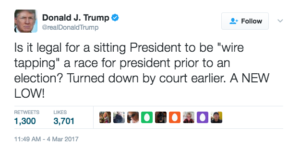In more news of assertions made without backing (see previous post about the various norms of assertion), Joe Scarborough Tweeted:
The Trump camp released one positive tax return to distract from Russia hearings and the Trumpcare meltdown. That's painfully obvious. https://t.co/NLBVPJhwg6
— Joe Scarborough (@JoeNBC) March 15, 2017
Two assertions, really. #1: Trump leaked the return, and #2: He did it as a distraction.
The backing: That it’s “painfully obvious.” Pretty weak backing. But, hey, it’s Twitter.
Interestingly, Scarborough was challenged by one of Trump’s lawyers, Michael Cohen — in particular, that he should have some support for such claims:
.@JoeNBC As #potus @realDonaldTrump personal attorney, I know who has his taxes. You better have proof to back up your claim and big mouth!
— Michael Cohen (@MichaelCohen212) March 15, 2017
A pretty apt response, with a little heat to it. It is ironic, however, that a Trump representative is making hay out of someone making unsubstantiated claims. Oh, and then Scarborough took the bait:
And by the way "attorney":
1. Read the First Amendment
2. Save your dumb thug routine for someone who gives a damn. https://t.co/EZfiaEq2yp— Joe Scarborough (@JoeNBC) March 15, 2017
Oy vey. Wrong way to do this.
Scarborough is committing two errors here. First, is what’s been called the Free Speech Fallacy. John’s got a nice bit on it HERE, and we’ve got an entry in the coming Bad Arguments: 100 of the Most Important Important Fallacies. Here’s our line:
The fallacy arises when a contributor to a critical exchange confuses the protected freedom of expressing an opinion with correlate obligations to reply to freely expressed critical opinions of others.
And note, that using the Free Speech Fallacy is a form of ignoratio argument — that we change what’s being criticized from what was said to whether one has the right to say it. (I’d had an earlier point about this HERE, which I’d called the ‘meta-move’).  So taking the first amendment strategy is no defense against the request/demand for evidence. Nor is it a reply to the insult that he has a big mouth. In fact, some replies seem to confirm the accusations!
The second error is with taking a request, admittedly with heat, as purely intimidation. In a way, I think this is a bit of straw-manning, which is to focus on the tone of a challenge instead of the content, and then make the case that someone is using an ad baculum or some other scare tactic.
Imagine that A gives a crappy argument, perhaps that B has made some moral error. B, in reply, says something like:
Look, asshole, if you’re going to make a charge like that, you’ve got to have better grounds. Seriously, what’s wrong with you?
And A replies:
Now who’s the asshole… defending yourself with an ad hominem against me?
For sure, B put some stank on the reply, but there wasn’t an argument from A’s being an asshole to A making unsubstantiated claims. Rather, it was from A’s making unsubstantiated claims to A being an asshole. Mistaking heat of reply with a premise of argument or with intimidation is to mistake tone and content. And, you know, grownups who have hard conversations have to keep the two distinct all the time.








